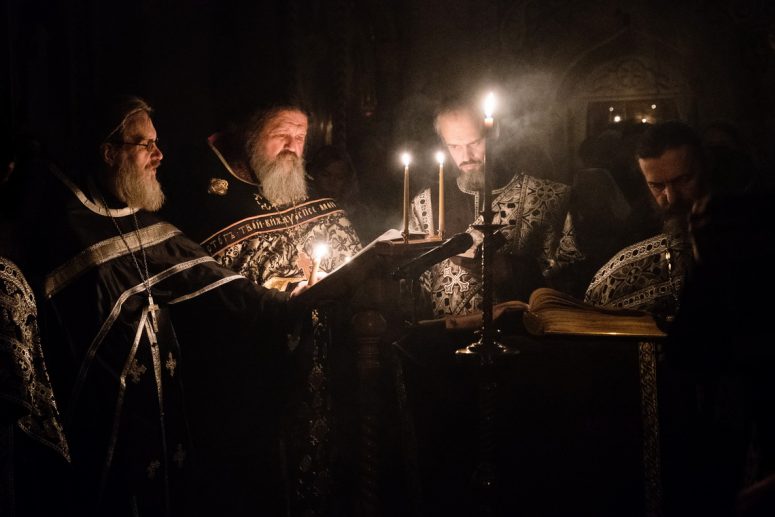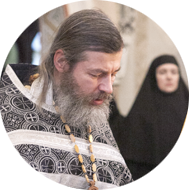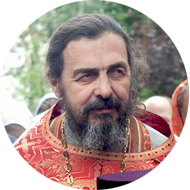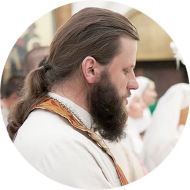

By Fr. Sergius Nezhbort
Sometimes we have to embrace the reality and accept the circumstances of our lives as they are. It doesn’t mean that we have done something wrong. Most likely, we simply have to go through that period in life. You’ve got to spend it with dignity. You must not step back, be scared and run away. You must remain with God. (Sermon after the Divine Liturgy on January 20, 2019)
***
Everyone has his or her own measure. It’s enough for one person not to offend his neighbours, while the other needs to go to church every day. We’ve got to find our own path, to find ourselves in the turbulent stream of spiritual life, and not be carried away by trifles. (Sermon after the Divine Liturgy on January 13, 2019)

By Fr. Alexander Pashkovsky
The Lord tells us in the Gospel that whenever we ask him for anything, we should ask with faith. The Lord is ready to give us whatever benefits us. We simply need not to limp in our faith. Our faith depends on how we live.
Why does the Lord fulfil saints’ requests? It’s because they walk with God all the time; they live by faith. We should live like that, too. […]
As soon as a person feels offended, he or she is exposed to the power of pride and therefore is left without God’s shield. That is when it is great to bring your sins to memory and to rebuke yourself. (Sermon after the Divine Liturgy on January 9, 2019)

By Fr. Valery Zakharov
When you pray in the church or at home or do the Jesus Prayer, it’s an attempt to stand before God; it’s an attempt to hear him and to subject your will to his. It’s an attempt at communication. […]
The confession is an act of sober reflection and an attempt to do away with the dust, misconceptions, and filth, and to restore one’s relationship with God. I wish it didn’t consist of listing the same failures time and time again but instead was a vision of God who walks by our side or waits for us. […]
God always treats us the same: with love. His love may be sorrowful or buoyant but it’s love nevertheless. (Sermon before a Confession in the Boarding Home for Children with Special Needs on January 11, 2019)

By Fr. Sergius Faley
As soon as you’ve caught yourself doing something wrong, and you feel that your conscience rebukes you for it, you should repent immediately. You’ll be lucky if you repent before you get to the analogion with the crucifix and the Gospel on it. […]
“Lord save you” is an expression we use very often. Do we remember that it’s a prayer? It’s great that we thank people by wishing them to be saved but this prayer is said heedlessly more often than not. It shouldn’t be: when we thank a person, we pray to God and ask him to save that person, so we should put more thought into it. (Sermon after the All-Night Vigil on January 26, 2019)

By Fr. George Glinsky
Instead of telling his or her loved ones about Christ whom he or she has found, a new convert often tries to rebuild his or her environment from the ground up and make it homogeneous so that he or she could practise religion comfortably. The said person does not think about the image of God that people around him or her carry inside. We have to acknowledge that all people are different, and each of them has their own path to God. The path to God is open for all people. Every person who has conscience and reason will definitely come to God. We should help others instead of interfering with them as they follow this path. […]
We must witness with our life because when we face ordeals, then we shall be able to show ourselves as preachers of the truth of Christ more fully. All extreme situations, let alone persecutions for the faith of Christ, will purify us before God’s face and show who we are and to which extent we are ready to speak about Christ, about God who opens the Heavenly Kingdom for everybody, about God who is Love. (Sermon after the Divine Liturgy on January 16, 2019)
***
We shouldn’t be looking for additional troubles and hardships on our road to the Heavenly Kingdom. Looking for spiritual adventures is a symptom of spiritual immaturity and folly. We must put up with the circumstances of our life that appear in front of us. We should accept everything that happens to us with patience and trust in God. […]
The trials that we go through are not only sent to us personally but also to all who are tied to us with invisible bounds of love. I’m talking about the Church of Christ. […]
Our trials, sorrows, and suffering must teach us to love and sympathise with people around us. Only then shall we be able to call ourselves Christians. (Sermon after the Divine Liturgy on January 23, 2019)




